What strange knots some tie themselves in over Brexit. The attitude of some of those opposed to Britain leaving the EU is this when it comes to free trade: when conducted with the EU, it is essential for our prosperity. But when conducted with any other country it is a dark threat to our very being. How else to explain the reaction of CBI director-general Carolyn Fairbairn to the publication of the Government’s proposed tariff rates, which would apply in the even of a no-deal Brexit. The new regime would see some tariffs imposed on EU goods which currently enter the country tariff-free – 18 per cent of EU imports by value would fall into this category. But overall it would mean a sharp drop in tariffs on goods from all around the world. While 80 per cent of our imports are currently tariff-free, following a no-deal Brexit this would be true of 87 per cent of imports by value.
Tariffs on some goods, such as imported cars, will remain as they are now (10 per cent) but in the event of a no-deal Brexit they would apply to imports from the EU as well as from the rest of the world. Tariffs on ceramics will also remain – varying between five and 12 per cent. But many other goods – such as car parts – will no longer attract tariffs, whether they are from the EU or the rest of the world. Many foods will continue to attract tariffs, in an attempt to protect farmers from competition. But it is a very mixed bag. Lamb – in which Britain is nearly self-sufficient – will continue to attract a basic tariff of 12.8 per cent, plus extra per weight, depending on whether the lamb is fresh, frozen, and what cuts are involved. Beef, in which we are less than self-sufficient – will see tariffs reduced to a basic 6.8 per cent, meaning those importing beef from outside the EU will pay around half what they do now. Beef imported from within the EU, on the other hand, will attract tariffs, unlike at present. For the consumer there will be some adjustment in prices, and it might be expected that we will eat a little less beef from the EU – and a little more from the rest of the world.
And Carolyn Fairbairn’s reaction? Freer trade with the rest of the world is, apparently, a “sledgehammer for our economy”. Actually, sledgehammers, in common with all ‘articles of non-malleable cast iron’, will continue to attract a tariff of 1.7 per cent. But many other tools and raw materials for the engineering and manufacturing trades will become tariff-free. How many times, for example, have we been told that the UK car industry will suffer because Brexit means we will no longer be able to import car parts from the EU? Actually, following a no-deal Brexit, car parts from all over the world will become tariff-free – helping to reduce costs for UK manufacturers. One thing often forgotten in the debate on trade and tariffs is that a lot of exporters are also significant importers of raw and semi-finished materials, so they still benefit from unilateral reductions in tariffs. Sure, some UK companies will suffer if they face competition from imports which are currently subject to tariffs but will no longer be so, but it has been proved beyond all reasonable doubt that protectionism ultimately has a net impoverishing effect on a country – it props up uncompetitive industries at the expense of more productive ones.
As for UK consumers, they will see some prices rise as many EU food imports become subject to tariffs which they do not currently carry. But many food imports from the rest of the world will fall in price. Under World Trade Organisation (WTO) rules we are obliged to levy the same rate of tariffs with all countries, save for those with which we have a formal trade deal. So, following a no-deal Brexit, EU imports would become indistinguishable, from a tax point of view, from those, say, from Brazil. But overall, the tariff rates today would mean a lowering of consumer prices.
Of course the tariff rates announced today only amount to a partial liberalisation of trade. They will do nothing, for example, to reduce the tariffs which have to be paid by UK exporters. These will only be reduced if other countries reduce their tariffs – which is only realistically going to happen if we do formal trade deals with them. But the no deal tariff reductions – which are temporary, scheduled to last 12 months – are a notice of intent: that Britain wants to liberalise trade, and is very open to slashing tariffs. At a time when the US and China are engaged in a trade war, it should help bring countries to table.
There are some claims that the Government has published these tariff rates in the hope of frightening MPs into ruling out a no-deal Brexit. It should do the opposite, and make them think of how we can advance as a nation if we regain control of our own trade policy.







Comments